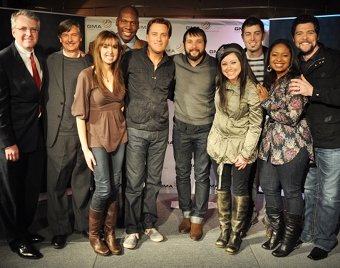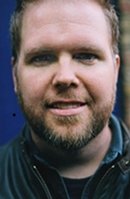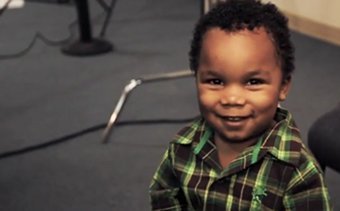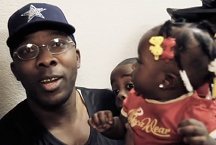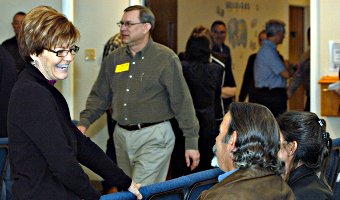• The University of Mary Hardin-Baylor will present its 71st annual Easter pageant March 31 at 12:30 p.m., 3 p.m. and 5:30 p.m., all outdoors in front of the Luther Memorial arches. The reproduction of Passion Week is free and open to the public. Almost 200 UMHB students, as well as many children from the community, participate in the production.
• Contemporary Christian artist Jimmy Needham is the headline attraction for the 15th annual HPU Fest at Howard Payne University April 10. Additional performers include Ben Rector, Justin Cofield Band, Miranda Dodson and HPU student performers Katie Curry, One Less Stone, Vinyl Club, Chronic Frailty and Rise to the Challenge. The free concert begins at 3 p.m. and will be held in Old Main Park. HPU Fest also will feature a chili cookoff, refreshments and vendor booths.
|
The daughters of Sam Hall admire the Sam B. Hall Jr. Civic Service Award, which was presented posthumously from East Texas Baptist University to their mother, Madeleine. Becky Palmer, Amanda Wynn and Sandra Bodenhamer accepted the inaugural presentation of the blown-crystal cup on their mother’s behalf, along with her sister-in-law, Kathleen McLendon. The ceremony was in connection with the Sam B. Hall Lecture Series, endowed in 1993. Hall, a graduate of the university, was lawyer, civic leader, a member of the House of Representatives and a U.S. district judge.
|
• The annual ministers’ wives’ retreat will be held April 15-17 at Riverbend Retreat Center in Glen Rose. Rhonda Rae is the keynote speaker, and Vonda Dyer will lead worship. The registration deadline is April 1. For more information or to register, go to www.texasbaptists.org/ministerswives.
• Howard Payne University will hold Celebration Week April 12-16 featuring the inauguration of Bill Ellis as the university’s 19th president. The weeklong slate of events will highlight HPU’s history and mission through the theme “Heritage, Purpose, Unity.” Additional events include the dedication of the newly renovated Mims Auditorium and the Paul and Jane Meyer Faith and Life Leadership Center. For more information, call (325) 649-8409.
• San Marcos Baptist Academy will hold an open house for prospective students and their families April 18 from 2 p.m. to 4 p.m. Call (512) 753-8000 for more information.
• Steve Wyrick, professor of Old Testament, Hebrew and archaeology, will speak on “The Current State of Archaelogy in the Holy Land” at the University of Mary Hardin-Baylor’s College of Humanities’ spring lecture series April 19 at 11 a.m. in Brindley Auditorium of the York Science Center.
• A building dedication service for the Texas Baptist Historical Museum in Indepen-dence will be held April 27 at 1 p.m. The dedication will be followed by a reception and hosted tours of Windmill Hill and Old Baylor Park, original locations of Baylor University and the University of Mary Hardin-Baylor. The event is free, but a reservation at (214) 828-5342 is necessary for preparations.
• A leadership training seminar led by the National Center for Church Architecture will be held at Dallas Baptist University May 1 from 9 a.m. to 4 p.m. The topic will be “Effective Leadership for Church Relocation.” The seminar will provide guidelines for determining the benefits and drawbacks of relocations. Participants also will receive information on working with architects, engineers, builders and municipalities, as well as organizing a master building plan for a new church campus. The seminar is designed for all levels of church leadership, including pastors, associate ministers and lay leaders. For more information, see www.tncca.net.
• John Lee Hancock, writer and director of the Academy Award-nominated film The Blind Side and a Baylor Law alumnus, will be the keynote speaker at the law school’s commencement exercises May 1 at 10 a.m.
• Wayland Baptist University is planning a June 9-23 trip to Ecuador. Students will work for a week in the rain forest and in an orphanage teaching English. Students also will participate in whitewater rafting, mountain biking, rappeling down a waterfall, horseback riding and other activities. Alumni are invited to participate, but the $900 deposit is due. For more information, call (806) 291-1045.
• A pew from Carey Baptist Church in Moulton, England, has been given to the B.H. Carroll Theological Institute by Bob and Gloria Jaynes, members of South Main Church in Pasadena. The pew was contemporary with the church’s famed pastor William Carey.
• Charles Chaput, archbishop of Denver, delivered a lectured titled “The Vocation of Christians in American Public Life” March 1 at Houston Baptist University. Chaput, a member of the Prairie Band Potawatomi Nation, was ordained a priest in 1970.
• David Marks has been appointed chief medical officer by Baptist Child & Family Services.
Anniversaries
• Miles Miears, 10th, as pastor of Jonesboro Church in Jonesboro, Feb. 21.
• Ed Seay, 20th, as pastor of First Church in Magnolia, March 21.
• Mike Flanagan, fifth, as pastor of First Church in Whitesboro, April 10.
• Crutchfield Heights Church in Sherman, 50th, April 18. Mike Moody is pastor.
• Wedgwood Church, Fort Worth, 50th, May 1-2. The church will be open Saturday from 10 am. to 6 p.m. for tours, scrapbook viewing and some scheduled reunions. On Sunday, continental breakfast will be served from 8:30 a.m. to 9:30 a.m. Photographs and other memorabilia will be displayed. Following the morning service, a catered barbecue lunch will be served at the Will Rogers Center. Cost is $10 for people ages 6 and older and $5 for children who are younger. Reservations for the lunch can be made at www.wedgwoodbc.org and are requested by April 16. Al Meredith is pastor.
• Jerry Wilson, 60th in ministry, May 2. The day also marks his 10th anniversary as pastor of Southcrest Church in Lubbock. A reception in honor of Wilson and his wife, Nadell, will be held at the church from 3 p.m. to 5 p.m.
Deaths
• James Nelson, 81, March 10 in Greenville. He served more than 60 years in the music ministry of First Church in Wolfe City. He began as music director at age 19, and in 1978, became the church organist. He was preceded in death by his sister, Erin Stanley; and brother, Charles. He is survived by his wife of 56 years, Peggie; daughters, Vanessa Cherry and Jamie Thomas; sister, Ethlyn Dozier; and five grandchildren.
• Preston Taylor, 83, March 11 in San Antonio. He had been pastor of churches in Zapata, Mirando City, Sanderson, Hondo, Brackettville, Dilley, Carrizo Springs, Beaumont, Fairfield and Bosqueville. He was pastor of First Church in Zapata at the time of his death. He also served as a missionary in Argentina and wrote more than two dozen books. He was preceded in death by his wife, Dovie in 1997. He is survived by his son, Preston Jr.; daughter, Marsha Martin; sister, Mabel Titsworth; six grandchildren; and three great-grandchildren.
• Orel Speed, 80, March 15 in Beaumont. He was ordained in 1948 at First Church in Galena Park. He was pastor at churches in New Diana, Kirbyville, Kountze, Borger, Poteet, Silsbee, Vidor, Houston, Rye and Logansport, La. He is survived by his wife, Winona; son, Tracy; daughter, Kasandra Sherrod; sister, Ruth Hunt; four grandchildren; and four great-grandchildren.
• Loeen Bushman, 78, March 15 in Weatherford. During her days as a student at Baylor University, she was the accompanist for the Baylor Religious Hour Choir under the direction of Dick Baker. She went on to serve as organist for several churches including Travis Avenue Church in Fort Worth, Rosen Heights Church in Fort Worth, and First Church in Midland, where she also served as youth director. She also served on the staff of the Baptist Radio and Television Commission and was organist for the Baptist Hour radio broadcast for many years. While there, she produced albums for various artists on the Christian Home music label. She also served as accompanist for the Singing Men of Texas and the Southern Baptist Centurymen. She traveled extensively for the International Mission Board, including three years in South Korea at the Baptist seminary in Taejon and one year at the Baptist seminary in Hong Kong teaching organ and piano. She is survived by her twin sister, Lois Kelly.
Event
• The women’s ministry of First Church in Irving will host “So Long Security,” a live simulcast event of speaker and author Beth Moore April 24 from 9 a.m. to 3 p.m. Advance tickets can be purchased for $25 at www.firstirvingfamily.org/simulcast .html. A discounted rate of $10 is available for college students and adults 65 years or older. Lunch in included. At the door, tickets are $35. For more information, call (972) 253-1171.
Revivals
• East Sherman Church, Sherman; March 28-31; evangelist, Lash Banks; music, David Garrett; pastor, Roland Ouellett.
• Crutchfield Heights Church, Sherman; April 4-7; evangelist, David Crain; pastor, Mike Moody.
